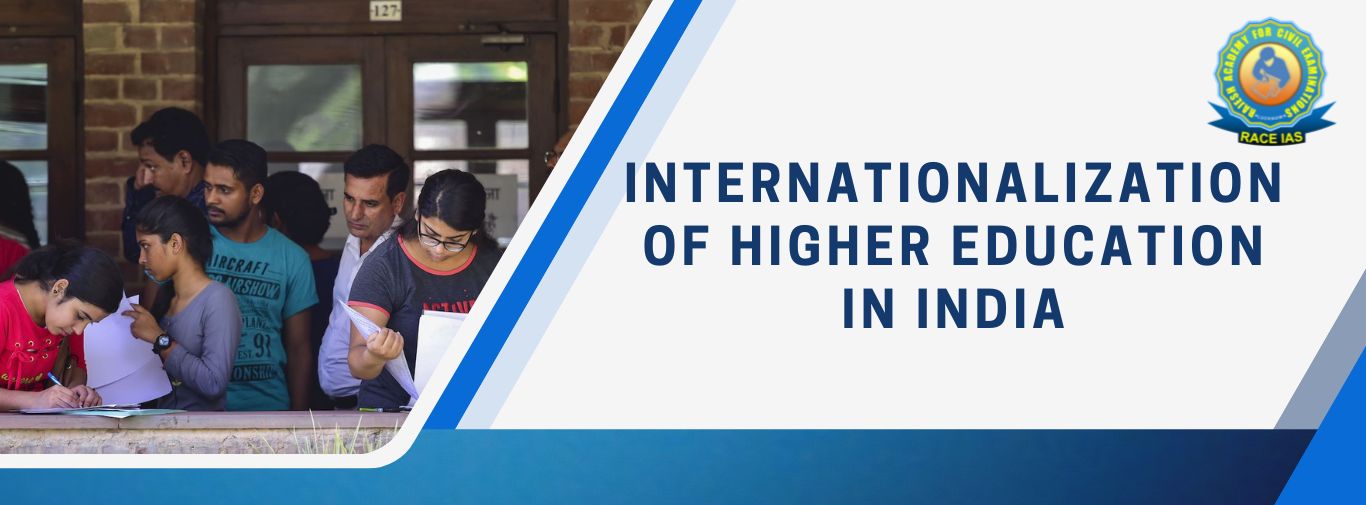
Internationalization of Higher Education in India
Internationalization of Higher Education in India
Reference:
- In recent days, as per the recommendations of the new National Education Policy, the University Grants Commission has given approval to foreign universities to open their campuses in India.
- The University Grants Commission has issued a draft titled 'Establishment and Operation of Campuses of Foreign Higher Educational Institutions in India-2023' for setting up and operating foreign institutions in India.
- The draft gives autonomy to foreign universities to decide admission process, fee structure, appointment and remuneration of faculty and repatriate earned income.
- For the first time in the initial phase of economic liberalization in the year 1995 and also in 2007 a bill was brought for foreign universities to start their campus.
Norms set for Foreign Universities:
- Only those foreign institutions are eligible in India, which have made it to the top five hundred of the global ranking overall or subject wise or are recognized as an institution of repute in their home country.
- These universities will be able to start full time programs only.
Benefits of Internationalization of Higher Education:
- Competition between students and institutions will increase in the higher education sector.
- Foreign Universities will compete healthy with Universities in India to attract talented professors, researchers and students.
- Indian Universities to improve their education system for industry projects, talented students and faculty.
- Internationalization of education will increase the promotion of Indian education abroad.
- This will increase the quality of Indian education and there will be a lot of reduction in students leaving India and going abroad.
- Indian students will be able to get foreign degrees at a lower cost and India will also be established as an affordable and attractive center of study and research.
- The huge demand for international education among Indian students will begin to be met.
- In the year 2022 itself, about four and a half lakh Indian students went abroad for higher education. Every year about twenty eight to thirty billion US dollars will be saved from going out of our country.
- It is estimated that by 2024, 18 lakh students will go abroad and spend about 6.4 trillion rupees, which is 2.7 percent of India's GDP.
- According to statistics, in the first three months of 2022, one lakh thirty three thousand one hundred and thirty five students left India for academic pursuits, while in 2020 about two lakh sixty thousand and in 2021 about four and a half lakh Indians took education abroad , which shows an increase of 41 percent in just one year.
- The brain drain out of India will stop.
- Apart from Indian students, students from the subcontinent and other developing countries can also pursue education in these institutions, which will help India establish strong ties with other countries along with multi-culturalism.
- Foreign capital inflow will increase in the Indian economy.
- Many employment opportunities will also be created for small businessmen and artisans.
- Foreign universities will also help in increasing the access of Indian students to quality education and converting India's population into human resource.
Position of Universities in India:
- There are more than one thousand universities and more than forty two thousand colleges in India.
- Despite having one of the world's largest higher education systems, India's Gross Enrollment Ratio (GER) in higher education is only 27.1 per cent, one of the lowest in the world.
- There are many areas where the current Indian higher education system needs improvement.
- None of the Indian universities feature in the top 100 in the QS rankings.
- Research and development is neglected in Indian universities.
- Challenges such as shortage of staff, limited resources, student dropout and politicization of institutions prevent Indian academic institutions from adding value to them.
- Career counseling and employability is one area in which Indian institutions lag far behind their foreign counterparts.
- Our curriculum is not based on discussions with people who ultimately employ or hire our students.
University Grants Commission:
- On December 28, 1953, the then Education Minister Maulana Abul Kalam Azad formally laid the foundation stone of the University Grants Commission.
- The University Grants Commission is an autonomous organization established by an Act of Parliament in the year 1956 to determine the parameters related to university education.
- Apart from providing grants to eligible universities and colleges, this commission also gives necessary suggestions to the central and state governments for the development of higher education.
- Its headquarter is located in New Delhi. It has six regional offices in the country - Pune, Bhopal, Kolkata, Hyderabad, Guwahati and Bangalore.
Conclusion:
- India's economic position has strengthened globally in recent times. The nature of jobs and the demands of employees are changing rapidly, which directly puts the onus on education providers to anticipate this change and prepare students accordingly.
- Foreign universities have mastered in this art. On this basis, foreign institutions may find India more favorable to them than it was two decades ago. The academic system, land ownership, taxation and regulations related to the recruitment of teachers are common subjects of his concern.
- Necessary action should be taken on these. It should also be kept in mind that foreign institutions should set up their campuses in India for collaboration and knowledge-sharing and not just for commercial interests.
- These institutions should not be limited only to the elite and upper class, but should also provide proper opportunities to the students of the deprived sections while protecting their interests.
- Therefore foreign institutions should be welcomed to take India forward through high quality education and best work-culture through academic sovereignty, minimal governance, visionary management, good faculty, linkages with industries and academic activism of students.
-------------------------------------------------------------------------------------